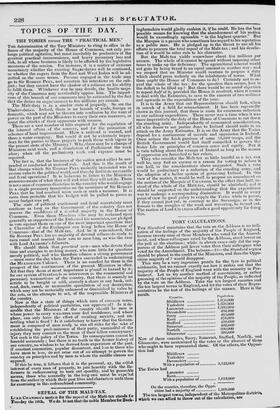TOPICS OF THE DAY.
THE TORIES versus THE "PRACTICAL MEN."
Tfm determination of the Tory Ministers to cling to office in de- fiance of the majority of the House of Commons, not only pro- longs political agitation, but must inevitably be productive of the greatest practical inconvenience, and heavy pecuniary loss and risk, to all whose business is likely to be affected by the legislative measures of the session. For instance, it is a matter of extreme uncertainty whether the existing Sugar-duties will be continued, or whether the sugars from the East and West Indies will be ad- mitted on the same terms. Persons engaged in the trade may go to Sir ROBERT PEEL, and ascertain his intentions on the sub- ject; but they cannot have the shadow of a reliance on his ability to fulfil them. Whichever way he may decide, the hostile majo- rity of the Commons may successfully oppose him. The import- ance of this branch of our commerce may be estimated by the fact that the duties on sugar amount to five millions per annum.
The Malt-duty is in a similar state of jeopardy. So are the tinkle-duties. Indeed, there is no branch of trade, foreign or domestic, which may not be thrown into confusion by the want of power on the part of the Ministers to carry their own measures, or resist the attacks of their opponents with success. There arc a vast number of bills required for the regulation of the internal affairs of the country, and for the promotion of schemes of local improvement. Here a railroad is wanted, and there a water company. But would it not be extremely impru- dent for the parties to these projects to push them with vigour in the present state of the Ministry ? Why, there may be a change of Ministers next week, and a dissolution of Parliament the week after; when all the preliminary work and expense must be repeated.
The fact is, that the business of the nation must either be sus- pended or conducted at unusual risk. And this is the result of that change which Sir Roman. PEEL modestly insinuated was to restore calm to the political world, and thereby facilitate mercantile and ffical operations ! It is ludicrous to listen to the Ministers' announcements of what they will and what they- will not do. There is not a man of common discretion in the country who would engage in a single pecuniary transaction on the assurance of Sir ROBERT PEEL that he bad resolved upon such or such a measure. It is more than probable that his budget will be pulled to pieces as never budget was yet. The state of political excitement and fiscal uncertainty must continue as long as the Government of the country does not possess the confidence of a decided majority in the House of Commons. Even those Members who may be reckoned upon generally as supporters of the Duke and his associates, are pledged to vote against them on one of the most important questions that a Chancellor of the Exchequer can bring before the House of Commons—that of the Malt-tax. And be it remembered, that Sir ROBERT PEEL has no majority of devoted adherents ready to turn round and rescind their vote to save him, as was the case with Lord ALTHORP'S followers.
We should think that practical men—men who devote their time and energies to making money, who care little for questions merely political, and who therefore admire a strong government —must curse the day when the Tories succeeded in undermining the MELBOURNE Cabinet. There is no comfort for them in the prospect of the continuance of the present Ministers in office. All that they deem of most importance is placed in hazard by it; for our system of taxation is so interwoven in the commercial and pecuniary transactions of the country, that there is scarcely an article to be bought or sold, scarcely a share in any bank, rail- ' road, dock, canal, or mercantile speculation of any description, which may not be materially enhanced or diminished in value by the acts, or the attempts to act, of the responsible Ministers of the country. Now is this a state of things which men of COIDinon sense, independently of political partialities, can approve of? Is it de- sirable that the Ministers of the country should be men in whose power to carry treasures none feel confidence, and whose plane, can only have the effect of creating anxiety, and un- settling what is fixed ? Is it satisfactory to know that the Govern- ment is composed of men ready to run all risks for the sake of establishing the predominance of their party, unmindful of the injury they may commit on the mass of their fellow countrymen? Yet such is the policy of the Tories. Its consequences cannot be foretold accurately ; but there is no truth in the former history of our country, no wisdom to be derived from experience of the past, if constant commotion, popular discontent, and loss to those who have most to lose, do not arise out of an attempt to govern the country on principles and by men to whom the middle classes are opposed. If this be true, it follows that it is the personal, ay, the selfish interest of every man of property, to join heartily with the Re- formers in endeavouring to turn out speedily, and by peaceable means, those who assuredly in the long-run must be expelled from the authority which their past lives and characters unfit them for exercising in this enfranchised community.


























 Previous page
Previous page